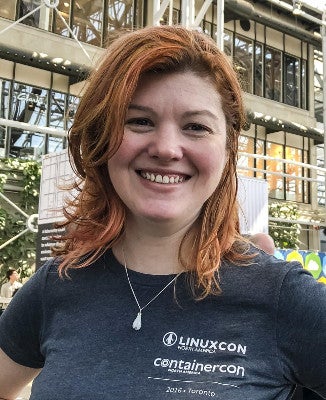There have always been integration challenges with open source software, whether in pulling together Linux distributions or in mating program subsystems developed by geographically distributed communities. However, today we're seeing those challenges writ large with the rise of large ecosystems of projects in areas such as networking and cloud-native computing.

Integration was one topic of my conversation with Heather Kirksey, the VP of Community and Ecosystem Development at the Linux Foundation, recorded for the Cloudy Chat podcast. We also talked about modularity and how developers can get involved with open source networking. For the past three years, Kirksey has directed the Linux Foundation's Open Platform for Network Functions Virtualization (OPNFV), which is now part of the LF Networking Fund that's working to improve collaboration and efficiency across open source networking projects.
"One of the challenges we have right now is that we have brought together a bunch of formerly discrete networking communities," says Kirksey.
"We always worked across projects," she notes. "Certainly, OPNFV's raison d'etre was cross-project integration. Now, being in the same [Linux Foundation Networking group], trying to share events, sharing budget, trying to set shared priorities for communities that were used to being self-contained, that I've got to say is a problem."
It's a matter of shifting priorities from an inward focus—which is often beneficial when a project is starting out—to a more external one, Kirkey told me. "It is challenging for folks to start thinking both in terms of what their specific projects need, but also in this larger context of, 'We're all in the same success or failure boat together.' Start to have as your default: 'How do I work with people that I may have touched in the past, but now I'm part of the same organization with?'"
In part, it's just about taking time because, according to Kirksey, "We focus on the code, but it's made of humans. It's creating opportunities for those folks to actually meet each other, to start seeing collaborative successes with each other."
At the same time, modularity is important as well. For one thing, it lowers the bar for contributing to a project. Furthermore, Kirksey says, "from an end user point of view, you might not want every piece of something. You might just want a few things. Because there are so many projects that work together, you want them to be discrete. You want them to plug in together very well."
The OPNFV project, which has had to focus on system integration from the beginning, found that having a continuous integration/continuous delivery [CI/CD] system, together with automated tests, has been a useful tool for integrating modular elements.
Kirksey suggests that OPNFV is a good place to get started with open source networking because it is the system integration, deployment, and test work that looks at the entire networking stack. She adds: "To a certain extent, you're going to get exposed to a lot of other technologies and other upstream projects. Also, because we focus a lot on testing, a lot of times [if developers are] coming into a project new, it's a great way to get involved in testing because testers usually want people. They're usually very friendly, very happy to have you. It's an easy way to get familiar with the code because you're working on testing it. That can be a little bit less daunting to write a test case than to submit a patch or pull request."
She concluded by observing that there are benefits to projects working together that go beyond the integration of software modules. "There's insight to be learned from folks who are solving, maybe, different problems, or who have thought about them in a different way, or different use cases, or different end-user bases that have different needs. With the way the world is these days, if open source communities give us an opportunity to work our empathy muscles, it's a good, awesome thing."
For more, listen to the full podcast [MP3] of our conversation.







Comments are closed.